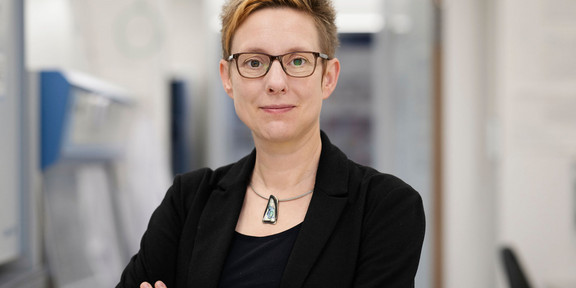UA Ruhr appointment: Kathrin Thedieck
- Research Alliance Ruhr
- UA Ruhr
- Research

Stress is typically considered unhealthy. Prof. Dr. Kathrin Thedieck, newly appointed Professor of Metabolism, Senescence & Autophagy at the Faculty of Medicine at the University of Duisburg-Essen, investigates how stress affects metabolism. At the Research Center One Health Ruhr of the University Alliance Ruhr, she investigates signaling networks that control tumor metabolism.
The enzyme mTOR (“mechanistic Target of Rampamycin”) controls metabolism in humans and animals and promotes cellular growth and proliferation. mTOR dysregulation results in aberrant metabolism and cell growth, leading to cancer, neuronal or metabolic disorders. Many drugs in the clinics or in clinical trials target mTOR or the complex signaling network around it. Kathrin Thedieck's Lab for Metabolic Signaling * at the Research Center One Health Ruhr investigates the molecular mechanisms mediating drug response or resistance, and the impact of anthropogenic environmental chemicals for therapy outcome.
In the ERC project “BEYOND STRESS” **, Kathrin Thedieck and team investigate stress granule (SG) proteins as a new class of regulatory proteins in the mTOR network. SGs are accumulations of proteins and nucleic acids which form during cellular stress to ensure survival. “Our data show that SG proteins bind mTOR even without stress and control its metabolic response. They thus influence cellular growth. We aim to understand the underlying mechanisms and investigate how SG proteins control tumor growth and cancer outcomes,” explains Thedieck, adding: ”The focus of our study is currently on breast cancer. However, the results will likely translate to other tumor entities.”
Thedieck studied biology at the University of Münster (1996-1998) and biotechnology at the Ecole Supérieure de Biotechnologie Strasbourg, France (1999-2001). From 2001, she conducted research at the Helmholtz Center for Infection Research (Braunschweig), where she received her doctorate in 2005. From 2006, she worked as a postdoc at the University of Basel with mTOR discoverer Michael N. Hall. Afterwards, she was a group leader at the University of Freiburg (2008-2013) and Associate Professor at the Universities of Groningen (Netherlands) and Oldenburg (2013-2019). Prior to her appointment at the UDE, she worked since 2019 as a professor and institute head of Biochemistry at the University of Innsbruck (Austria). Prof. Thedieck has received several awards for her work including a prestigious ERC Advanced Grant. For her studies on new therapeutic approaches for the rare disease tuberous sclerosis complex – caused by dysregulated mTOR – she received the Research Award of the German Tuberous Sclerosis Foundation, and in October 2024 she is awarded the Research Prize of the Klüh Foundation.
More information:
* Thedieck’s “Lab for Metabolic Signaling” online: www.metabolic-signaling.eu
** ERC Grants are the European Union's highest award for scientists. Kathrin Thedieck's ERC AdG project “BEYOND STRESS” is funded by the European Union with over 2 million EUR.
Contact:
Prof. Dr. rer. nat. Kathrin Thedieck, Faculty of Medicine, Research Center One Health Ruhr and UK Essen, Phone: +49 (0)201/723-7390

